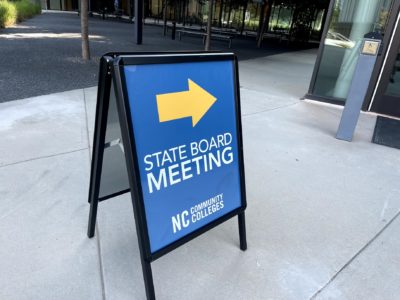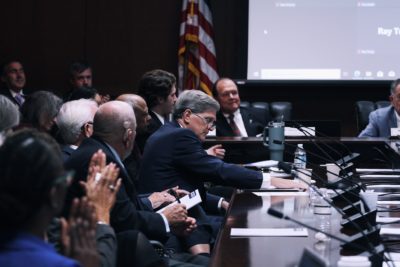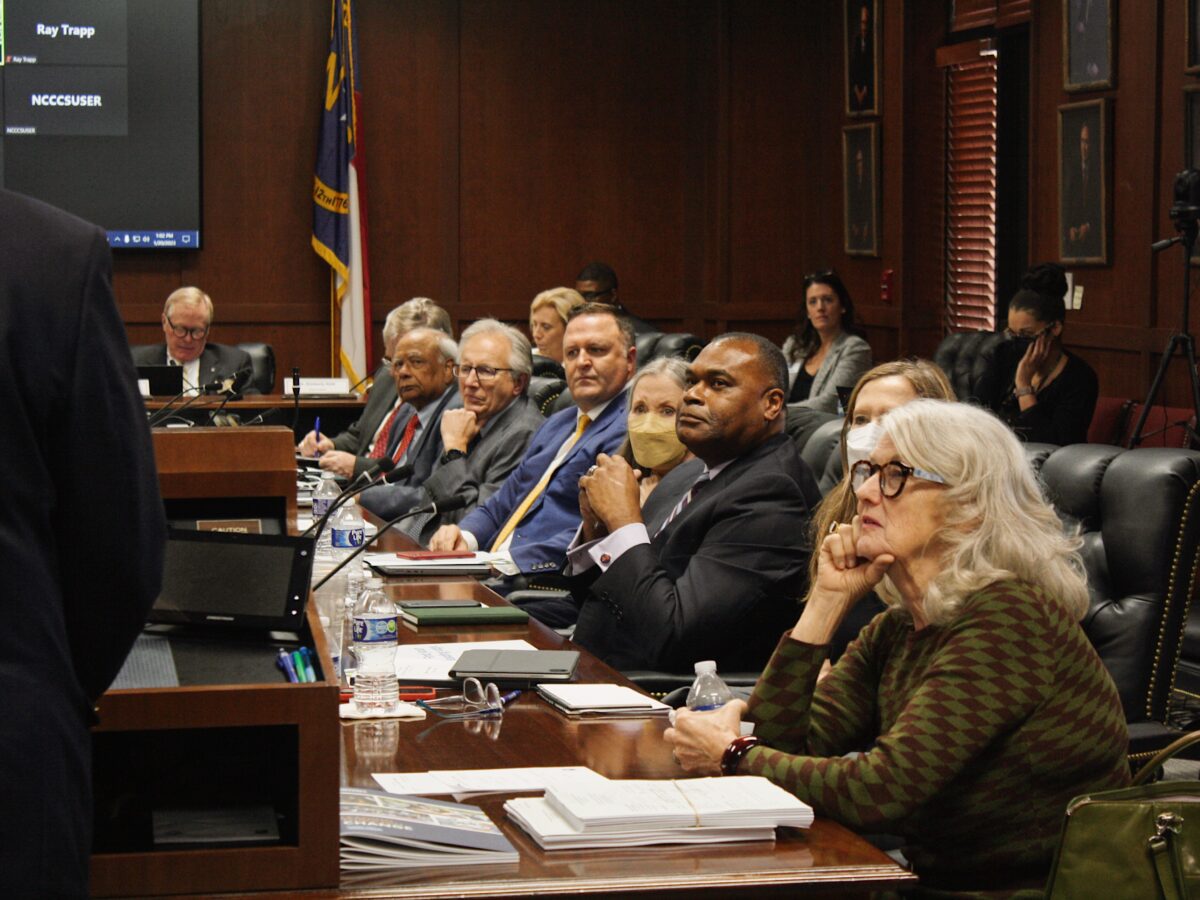
|
|
The State Board of Community Colleges continued planning for the work ahead of the N.C. Community College System (NCCCS) at its meeting last week, discussing implementation of its new strategic plan, the ongoing search for a new system president, and how to meet the state’s workforce and education needs.
The Board approved the system’s 2022-2026 strategic plan, “Leading Through Change,” at its October 2022 meeting. Last week, Dr. Patrick Crane, NCCCS vice president of strategic initiatives, presented tactics and tracking tools for the new plan, which staff plans to refine by March 1.
“Those are how we might track progress and how we know whether we’re having an impact or not – whether we’re actually meaningfully changing lives, as I think is our shared goal for the community college system,” Crane said. “Within the strategic plan itself, each of the goals has three to four primary measures, which are the big things we want to move on over the course of the strategic planning cycle. They tell us whether we’re having the impact on students, businesses, and the state that we want.”
![]() Sign up for Awake58, our newsletter on all things community college.
Sign up for Awake58, our newsletter on all things community college.
Board committee chairs and vice chairs will work with staff to create annual meeting calendars for operational and strategic planning. Strategic Planning Committee Chairperson Ann Whitford said the Board will work over the next month to align resources to support staff with the development of the tools and tactics. The Board will also work to clarify boundaries between oversight and management of system staff’s progress.
When possible, the system will use metrics that are already in place to track progress, Crane said. The system formed a small data advisory group – made up of presidents, system office staff, and board members – to discuss data sources, goal setting, and how metrics will be used throughout the life of the plan.
“This gives us an opportunity to set statewide goals,” Crane said. “That’s something we haven’t really done at the system level before.”
The system in transition
Ahead of the full Board meeting last week, the presidential search committee met on Jan. 18 to discuss the interview process for candidates. The Board expects three to five weeks of candidate sourcing, search committee co-chair Dr. Shirley Carraway said on Friday, until there is “a significant enough pool of candidates.” The first round of interviews will then start, held in person whenever possible.
Buffkin/Baker will vet both internal and external candidates before those interviews. The firm will provide a list of all applicants to committee members. The next committee meeting, which will kick off the vetting process, is tentatively scheduled for Feb. 1, depending on the number of applicants at that time.
The committee did not decide whether or not to publish semi-finalists at its public meeting. The search committee also did not discuss a salary range for the position. On Friday, the full Board met in closed session for over an hour to discuss two remaining questions from Buffkin/Baker about the search.
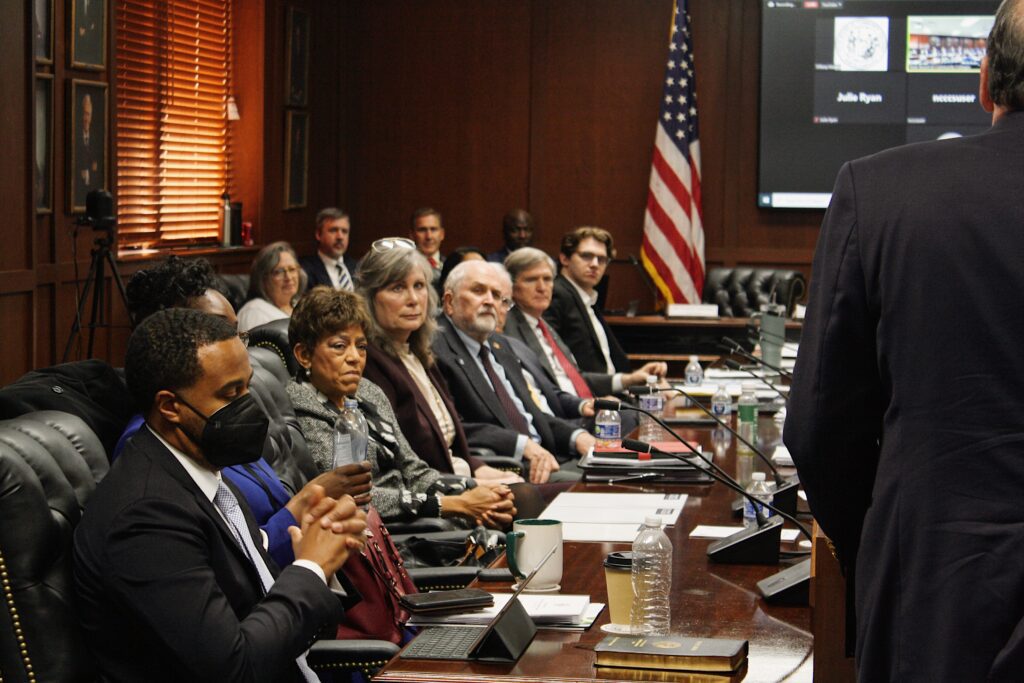
As Board members highlighted successes across the NCCCS at its meeting, the system also showed signs of being in transition.
In the final minutes of the meeting, member Sam Searcy raised anonymous concerns from system employees about Chair Burr Sullivan’s leadership style. Sullivan responded, “I am not going to respond to anonymous complaints.” He offered to talk to anyone who wants to in another setting.
“Our Human Resources department is available to all employees for any concerns related to their employment,” said Nathan Hardin, the NCCCS executive director of communications, in an email response to EdNC about HR processes for staff.
You can watch this part of the meeting at 4:03:00.
Workforce training
The Board also approved the allocation of more than $5 million to support the creation of new high-cost workforce programs at 14 of the system’s colleges.
The funding, awarded based on full-time enrollment, will build capacity for workforce training in high-demand occupations that typically requires significant start-up funds.
“The funds and support of the North Carolina General Assembly demonstrates our shared commitment to build strong workforce programs across our state in the industries that are growing and critical to future economic growth,” Sullivan said in a system press release. “High-cost programs are often too pricey for colleges to quickly implement and this financial support allows them to move immediately to address workforce needs and showcase the world-class dexterity and quality of our colleges.”
Applications opened last May and closed on Dec. 1. The system received 43 applications of more than $20 million in requests, said Estep, who is chair of the finance committee.
The funds will be allocated from Jan. 23, 2022 through June 30, 2024.
“This really is about creating economic opportunity,” Estep said. “There are some significant needs out there. These are non-recurring funds, so we’re hopeful that we will get some funds in the future.”
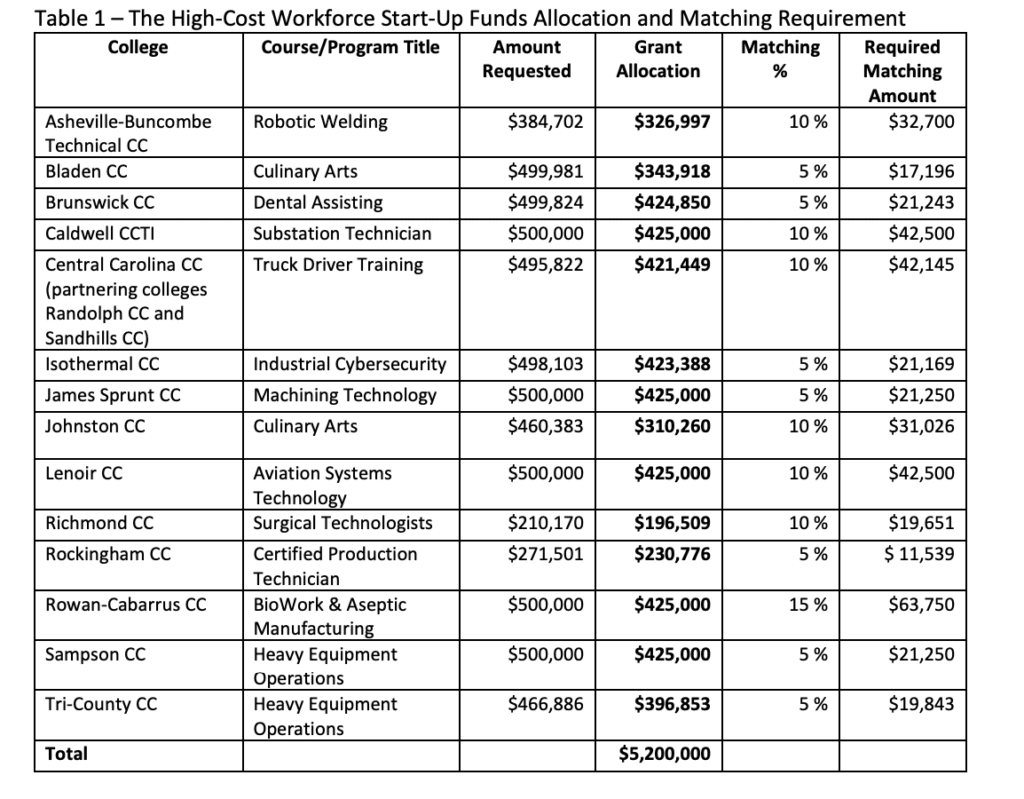
Near the end of the Board meeting, Bruce Mack, vice president of economic development at the system, led a brief discussion on workforce training. That discussion will continue in February, Sullivan said, and the Board will soon add a workforce training committee.
Money is not the biggest barrier in providing customized training, Mack told the Board, though it’s important. The biggest challenges are finding people to train, and then working with other agencies to do so, he said. Building program capacity and an inventory of college programs, Mack said, is necessary to meet the state’s workforce and education needs.
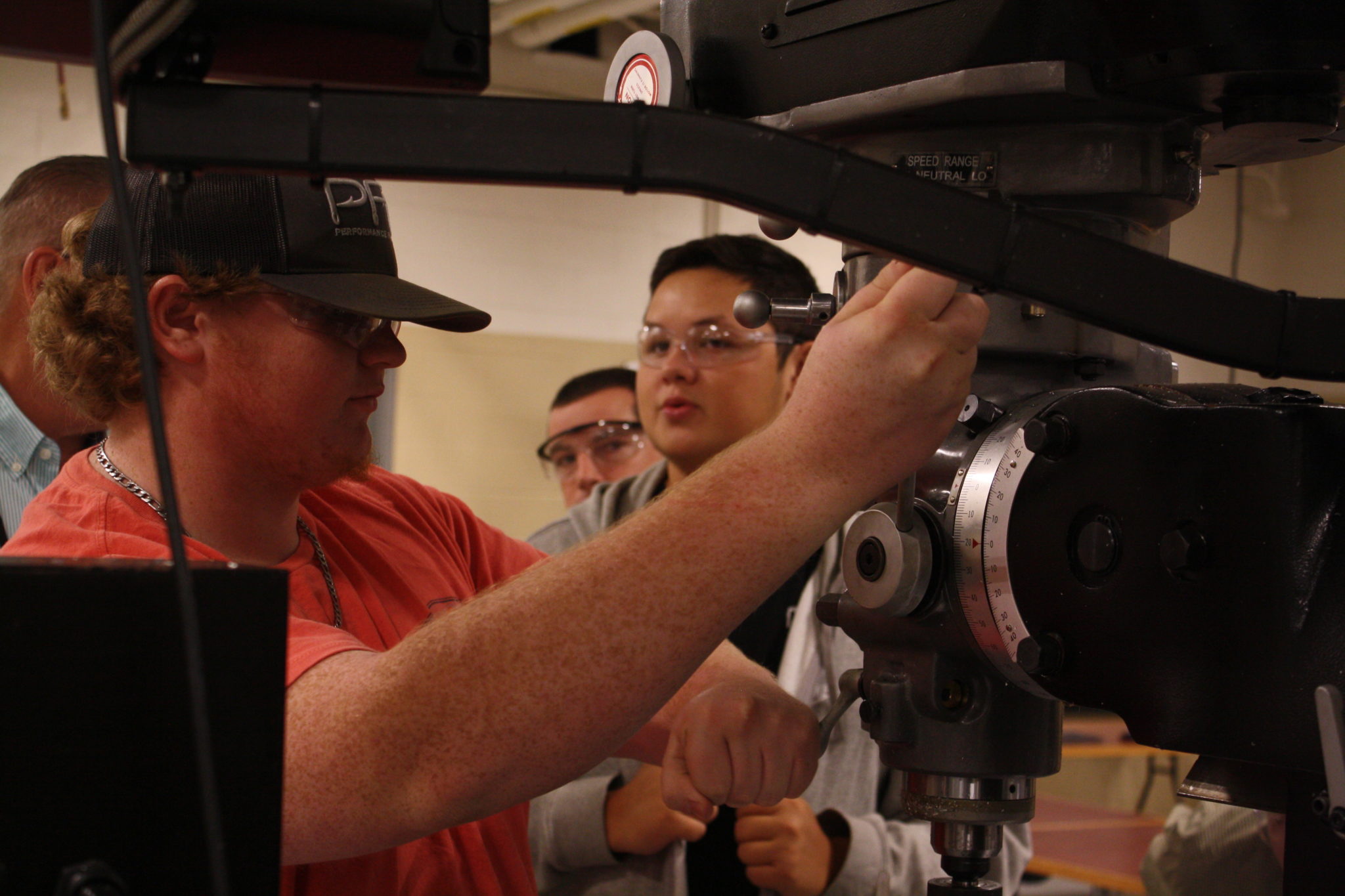
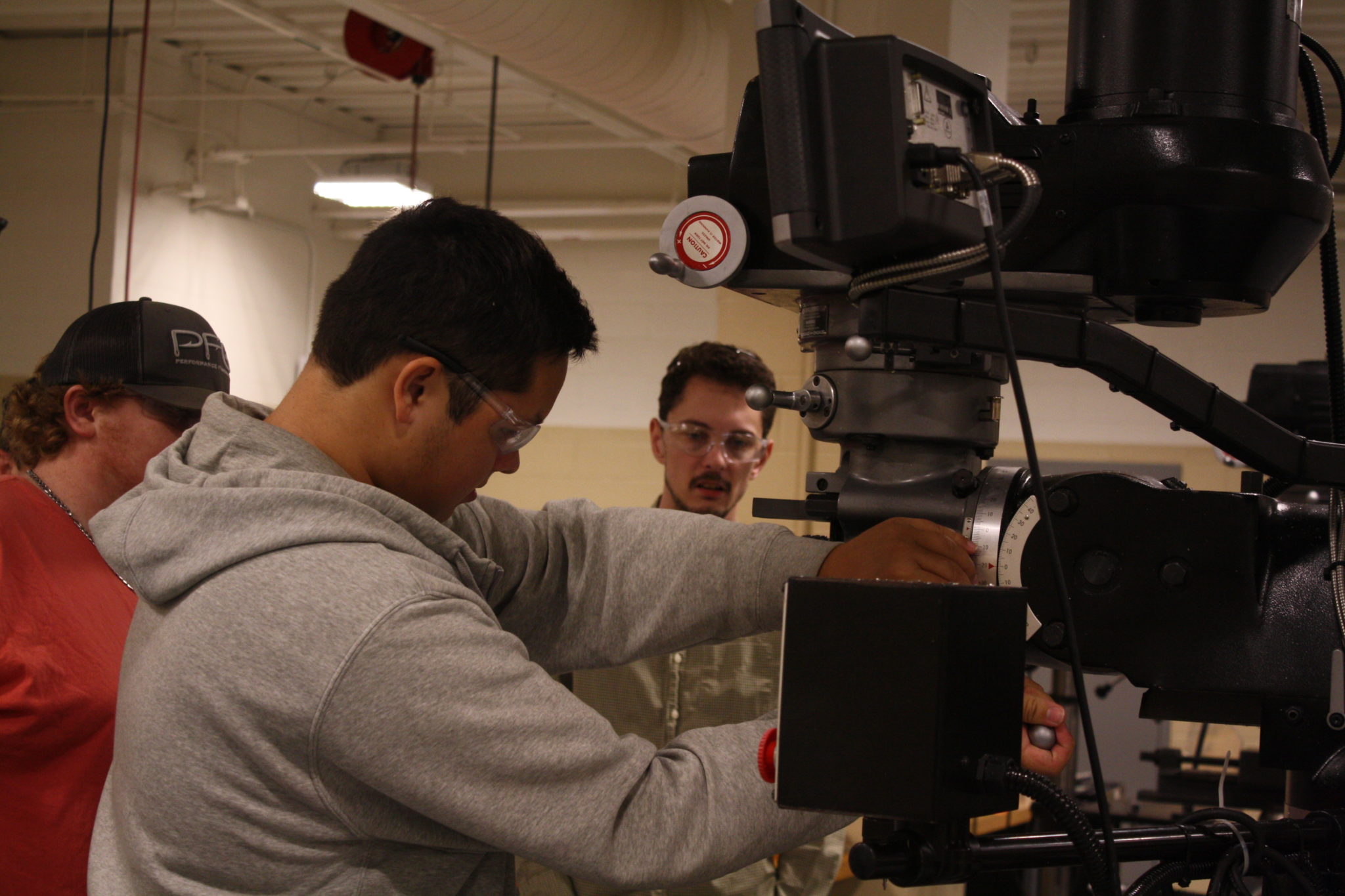
Workforce training is an important part of meeting the state’s educational attainment goal – to have 2 million North Carolinians ages 25 to 44 with a meaningful, high-quality credential beyond high school by 2030. That goal is also part of the system’s new strategic plan.
On Thursday, myFutureNC gave the Board an update on the state’s educational attainment. When myFutureNC launched in 2019, the state was 400,000 people short of meeting its goal, said myFutureNC President and CEO Cecilia Holden. According to Holden, the state is behind where it needs to be in order to meet the 2 million goal by 2030.
The Board also approved a report with recommendations on increasing nursing graduates, which will now go to lawmakers. The report, written in response to the state’s nursing shortage, focuses on addressing retention for NCCCS nursing students and nursing faculty shortages.
“We will come back and talk about some of these barriers that are being thrown up in the nursing area,” Sullivan said. “This board needs to be about knocking down barriers.”
Other meeting business
- The Board approved $1.275 million to support the creation of a Professional Development Facilitator Network to provide statewide development opportunities for English language instructors. Durham Technical Community College will lead the project.
- The Board approved a Specialized Course List for 15-Year-Old Firefighters, with an effective Feb. 1 start date. This follows legislation last July that lowered the enrollment age in community college fire training courses to “qualified youth 15 years and older.”
- Chaz Beasley, a former Democratic member of the North Carolina House of Representatives, was sworn in as a new member of the Board. “I’m very honored to be serving as part of this Board. I was born and raised in western North Carolina, and I have been very honored to be a part of a family that has used the community college system as a ladder to opportunity,” he said. “I’m very honored to be around so many people who understand that, and who are willing to do what it takes to make life better for so many North Carolinians.”
- The Board approved a reorganization of a system position to support a legislative liaison for the 2021-23 biennium from an unfilled technology solutions position. That staffer will report to Alex Fagg, NCCCS director of government relations. The Board also approved an 8% raise for Fagg, from his $115,000 salary. Fagg previously received a 19% raise at the Board’s October meeting; Personnel Committee Chair Bill McBrayer said Fagg’s new salary is in line with other legislative liaisons in state governments.
- Rondra McMillan was approved as the BioBetter Grant Director for the system. She will administer the more than $16 million from the Build Back Better Regional Challenge Grant to support the bioscience industry. Fifteen million will go to 10 colleges, and $1.4 million will be retained by the system office to administer the grant.
The Board meets next on Feb. 16 and 17.
Recommended reading
